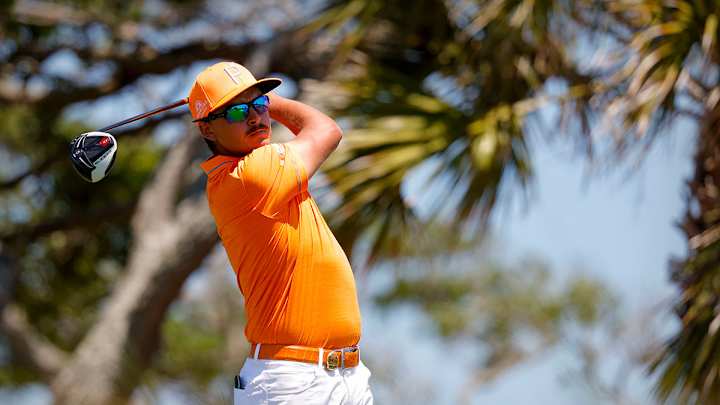Rickie Fowler's Still Stylish and Successful Even When His Game Goes Sideways

Whether he’s peddling a Mexican beer, selling you a mortgage or trying to revive a golf career once brimming with promise, Rickie Fowler has always gone about his business with a certain panache. To the great unhip, he’s just another handsome young man who wears orange on Sunday, which isn’t happening as often as it once did. No matter how he’s playing or what product he’s displaying, Li’l Rickie has always been the apple of the camera’s eye.
2014 Rank | 2021 Rank | |
|---|---|---|
Strokes gained (off the tee) | 50 | 88 |
Strokes gained (approach) | 66 | 157 |
Strokes gained (putting) | 37 | 126 |
Birdie average | 14 | 91 |
Greens in regulation | 100 | 156 |
Sand saves | 70 | 180 |
Total putting | 15 | 123 |
Among those in the know, however, Fowler’s prolonged stretch of mediocrity no longer qualifies as a cause for alarm or a surprise of any size. A missed cut in Las Vegas last week was his ninth in 20 starts since the November 2020 Masters. He has managed just one top-10 finish in those 11 months — a T-8 at the PGA Championship last May — and has tumbled from 18th to 128th in the Official World Golf Ranking since the 2019 FedEx Cup playoffs.
To a far greater extent than any other tour pro, Fowler’s popularity has always exceeded his performance level. His five PGA Tour victories in 275 events land him in the same neighborhood as Chris Kirk (four in 277) and Ryan Moore (five in 384). Neither of those guys ever appeared in a television commercial, sunbathing in a greenside bunker with a Corona in his hand, a playful ad in which Fowler’s charmed life provides the fitting punchline.
An errant shot lands in the ice bucket next to him, missing Li’l Rickie by inches. Lucky him.
A recent story on Forbes.com — “Mr. Congeniality: Rickie Fowler’s brand remains as bankable as ever” — offers little insight as to how anyone with five wins in 12 full seasons can achieve mainstream marketability comparable to that of Tiger Woods or Phil Mickelson. Mercedes-Benz, Farmers Insurance and Rocket Mortgage have all featured Fowler in their TV spots, which puts him in a very different corporate galaxy than the slew of tour pros who have done ads for their equipment companies. Our estimate of who will earn the most PIP Money on the PGA Tour in 2021 puts him solidly inside the Top 10.
We’re talking about a guy who hasn’t won a Tour event in almost three years, since the early-2019 gathering in Phoenix, which happens to be the same year Fowler got married. Far be it for anyone to blame the drought on his wife, Allison, however. Her hubby wasn’t exactly piling up the Ws before they tied the knot.
Like many collegiate golfers who became stars at Oklahoma State University, Fowler has been unable to match that success in the big leagues. Do you blame that on the school? Coming off his second Walker Cup appearance (2009), where Fowler went 4-0 to lead a U.S. rout and cap a highly decorated amateur career, he turned pro in the fall of ’09 and came within a whisker of winning his second PGA Tour start.
That playoff loss to Troy Matteson was no big deal. The kid hit the ground running and almost won in Phoenix, then again at the Memorial. Fowler vaulted into the OWGR top 50 barely six months after earning his card. When Corey Pavin added him to the 2010 U.S Ryder Cup team as a captain’s pick, a lot of people thought the skipper had lost his marbles. Fowler responded by rallying from 4 down with birdies on the final four holes to claim a must-have halve against Edoardo Molinari.
America lost the Cup that week, of course, but a star was born. Or so we all thought.
One could easily argue that a man who has won a Players Championship (2015), finished runner-up at all four majors in the same year (2014) and collected $40 million in earnings is hardly a bust. Fair point, although Fowler’s inability to reach the next level — and the lengthy slide in production over the last two seasons — represents a speedbump that cannot be ignored.
Has he gotten too rich for his britches? Have marriage and impending fatherhood (his first child is due next month) made life a bit too wonderful? Have all those outside interests led to compromised practice time and a reduced thirst for the weekend hunt? Perhaps most relevant of all, did Fowler’s decision to quit working with legendary swing coach Butch Harmon in 2019 precipitate his downfall?
In the early stages of their working relationship, which began in 2014, Harmon told me that Fowler’s biggest problem was his aggressive iron play, particularly on the weekends, when pins are tucked and misses can become far more costly. When Butch talks, you listen with both ears, and statistically, one can see how Fowler’s precision on approach shots has dropped off dramatically: from 29th in 2018 to 112th in 2020, then a career-worst 156th in 2021.
From there, it becomes a matter of getting up and down. Fowler’s scrambling and putting numbers are nowhere near where they once were. In 2017, he led the Tour in strokes gained putting and sand saves. In those two categories last season, he ranked 126th and 180th. Factor in a 156th in greens in regulation, and it adds up to a struggling golfer. A guy who starts trying to make things happen and only makes things worse.
In this case, it's a guy who has fallen from the top 20 in the world to outside the top 125 in two years. At age 32, Li’l Rickie has reached the crossroads, but when you’ve made $40 million and. have a baby on the way, maybe there are no wrong turns. If the golf thing doesn’t work out, he’d surely make a terrific game-show host.
Related: Rickie Fowler on track for multi-million dollar payday in PGA Tour's new PIP program
